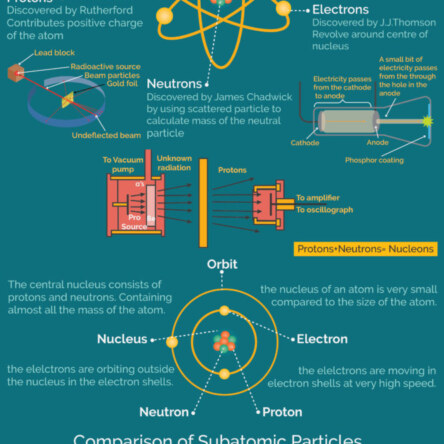What is the origin and significance of Madhubani art, and what are its key characteristics and themes?
The structure of an atom is made up of three particles: protons, neutrons, and electrons: Protons: Positively charged particles located in the nucleus Neutrons: Uncharged particles located in the nucleus Electrons: Negatively charged particles that orbit the nucleus in shells The nucleus is a dense,Read more
The structure of an atom is made up of three particles: protons, neutrons, and electrons:
Protons: Positively charged particles located in the nucleus
Neutrons: Uncharged particles located in the nucleus
Electrons: Negatively charged particles that orbit the nucleus in shells
The nucleus is a dense, positively charged part of the atom that contains more than 99.9% of its mass, even though it’s usually less than one ten-thousandth the size of the atom.
The arrangement and number of these particles in an atom determine its properties. For example, a hydrogen atom has one proton, one electron, and no neutrons.
To draw an atom structure, you can:
Draw a small circle to represent the nucleus
Write the number of protons and neutrons in the nucleus
Calculate the number of electrons in the atom
Draw the atom’s shells
Fill the shells with the correct number of electrons for the element
The number of protons and neutrons in an atom can be found on the periodic table. The top number is the mass number, which is the sum of the number of protons and neutrons. The bottom number is the atomic number, which is the number of protons.









Madhubani art, also known as Mithila painting, is a traditional folk-art form that originated in the Mithila region of Bihar, India, and Nepal. The name "Madhubani" means "forest of honey" in Hindi, which reflects the lush greenery of the region. [caption id="" align="aligncenter" width="800"] SourcRead more
Madhubani art, also known as Mithila painting, is a traditional folk-art form that originated in the Mithila region of Bihar, India, and Nepal. The name “Madhubani” means “forest of honey” in Hindi, which reflects the lush greenery of the region.
Source: Flickr
Origin and History
Madhubani art has a rich history that dates back to ancient times. It is believed to have originated during the time of the Ramayana, when King Janaka, the ruler of Mithila, commissioned artists to create paintings for his daughter Sita’s wedding to Lord Rama. Traditionally, this art was practiced by women of the region as a domestic ritual, and the skills were passed down through generations. The art remained confined to the walls and floors of homes until the 1960s when it gained wider recognition and started being done on paper and canvas for commercial purposes.
Significance
Madhubani art holds significant cultural and religious value. It is deeply intertwined with local festivals, ceremonies, and rituals. These paintings are often created during important life events such as births, marriages, and religious festivals, serving both as a form of storytelling and a means to invoke blessings from the deities. The art form also reflects the close relationship between the people of Mithila and nature.
Key Characteristics
a) Line Work: Madhubani paintings are characterized by intricate line work and elaborate patterns. Fine brushes, twigs, and matchsticks are often used to achieve detailed lines.
b) Geometric Patterns: Symmetrical and geometric patterns are a hallmark of this art form.
c) Filling Techniques: The space within the outlines is filled with vibrant colors and intricate designs, including cross-hatching and stippling.
Themes
Madhubani art is a vibrant and intricate form of expression that encapsulates the cultural heritage and traditional values of the Mithila region. Its unique style, rich symbolism, and deep connection to rituals and nature make it a significant art form in Indian folk culture.
See less